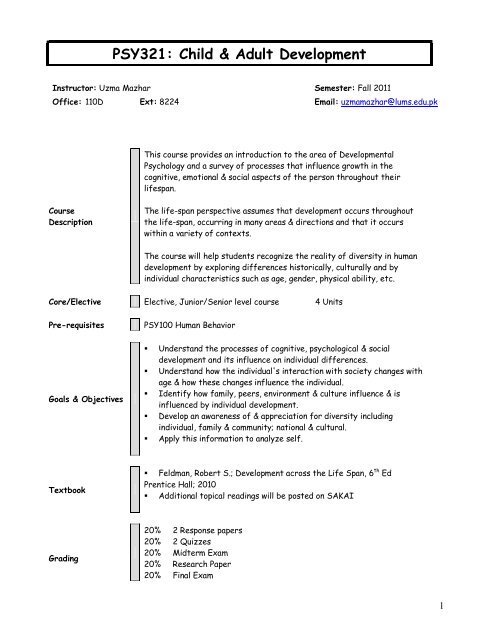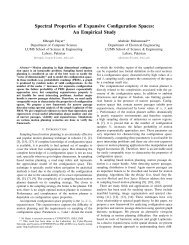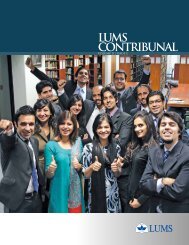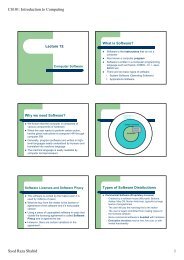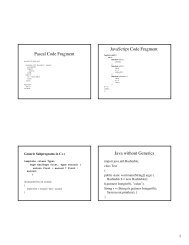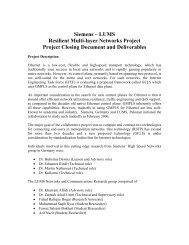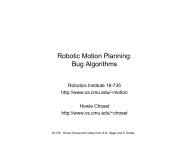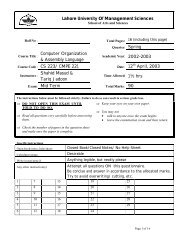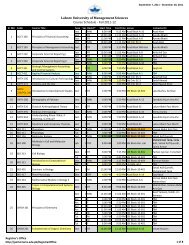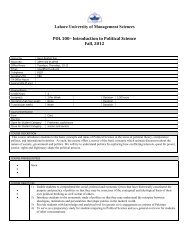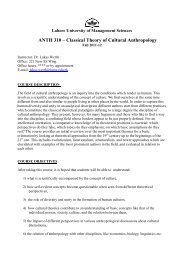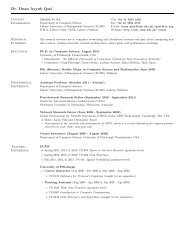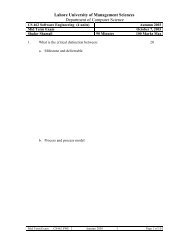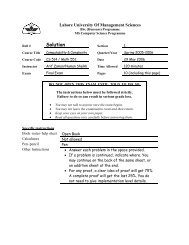SS 3413: Child & Adult Development
SS 3413: Child & Adult Development
SS 3413: Child & Adult Development
You also want an ePaper? Increase the reach of your titles
YUMPU automatically turns print PDFs into web optimized ePapers that Google loves.
PSY321: <strong>Child</strong> & <strong>Adult</strong> <strong>Development</strong>Instructor: Uzma Mazhar Semester: Fall 2011Office: 110D Ext: 8224 Email: uzmamazhar@lums.edu.pkThis course provides an introduction to the area of <strong>Development</strong>alPsychology and a survey of processes that influence growth in thecognitive, emotional & social aspects of the person throughout theirlifespan.CourseDescriptionThe life-span perspective assumes that development occurs throughoutthe life-span, occurring in many areas & directions and that it occurswithin a variety of contexts.The course will help students recognize the reality of diversity in humandevelopment by exploring differences historically, culturally and byindividual characteristics such as age, gender, physical ability, etc.Core/Elective Elective, Junior/Senior level course 4 UnitsPre-requisitesPSY100 Human BehaviorGoals & Objectives• Understand the processes of cognitive, psychological & socialdevelopment and its influence on individual differences.• Understand how the individual's interaction with society changes withage & how these changes influence the individual.• Identify how family, peers, environment & culture influence & isinfluenced by individual development.• Develop an awareness of & appreciation for diversity includingindividual, family & community; national & cultural.• Apply this information to analyze self.Textbook• Feldman, Robert S.; <strong>Development</strong> across the Life Span, 6 th EdPrentice Hall; 2010• Additional topical readings will be posted on SAKAIGrading20% 2 Response papers20% 2 Quizzes20% Midterm Exam20% Research Paper20% Final Exam1
PSY321: <strong>Child</strong> & <strong>Adult</strong> <strong>Development</strong>Weeks Topics ReadingsWeek 1IntroductionOverview of SyllabusIntroduction to Life Span <strong>Development</strong>.Week 2Week 3InfancyTheoretical perspectivesCognitive <strong>Development</strong> in Infancy.Social & Personality <strong>Development</strong> in Infancy.Week 4PreschoolCognitive <strong>Development</strong> in the Preschool Years.Social & Personality <strong>Development</strong> in the Preschool Years.Week 5Middle <strong>Child</strong>hoodCognitive <strong>Development</strong> in Middle <strong>Child</strong>hood.Social & Personality <strong>Development</strong> in Middle <strong>Child</strong>hood.Week 6AdolescenceCognitive <strong>Development</strong> in Adolescence.Social & Personality <strong>Development</strong> in AdolescenceWeek 7Week 8Week 9Week 10Midterm WeekAttachment TheoryTheories of Moral <strong>Development</strong><strong>Child</strong>hood Disorders & Treatment<strong>Child</strong> Abuse: Its impact on cognitive, emotional & socialdevelopment & adjustmentWeek 11Early <strong>Adult</strong>hoodCognitive <strong>Development</strong> in Early <strong>Adult</strong>hood.Social & Personality <strong>Development</strong> in Early <strong>Adult</strong>hoodWeek 12Middle <strong>Adult</strong>hoodCognitive <strong>Development</strong> in Middle <strong>Adult</strong>hood.Social & Personality <strong>Development</strong> in Middle <strong>Adult</strong>hood.Week 13Late <strong>Adult</strong>hoodCognitive <strong>Development</strong> in Late <strong>Adult</strong>hood.Social & Personality <strong>Development</strong> in Late <strong>Adult</strong>hood.Week 14Death & DyingDeath & Dying.Week 15Final Exam2
PSY321: <strong>Child</strong> & <strong>Adult</strong> <strong>Development</strong>Instructor PoliciesExams• Be punctual• Changes in the syllabus will be announced in class & through SAKAI• Read the required text before class.• Active participation: Be prepared to discuss the relevant topic.• Turn off cell phones. Keep them in your bag, not on your desk.• It is your responsibility to keep track of your attendance & grades.• NO make-up tests are given.• Inform the instructor if you will miss a test BEFORE the date, afterthe event is not acceptable and will result in point deduction.Attendance• Regular attendance is a requirement for this class.• You are allowed three (3) unexcused absences.• Absences exceeding limit will result in a letter grade drop.Ethics• Cheating, plagiarism or any other violations of the honor code will bedealt with according to LUMS policy.• This class abides with school regulations that prohibit discrimination,cheating, plagiarism, harassment & substance abuse.Research Paper:1. Any topic of your choice2. Topic and outline to be submitted before midterm exam for approval.Paper Guidelines:The length of the final paper should be 20 double-spaced typed pages.Use the American Psychological Association (APA) format for your paper.3


